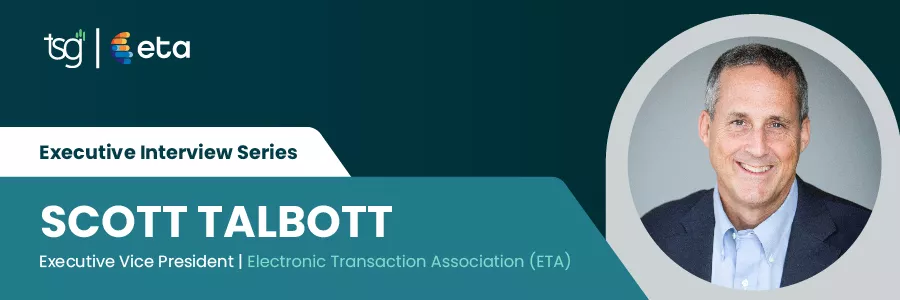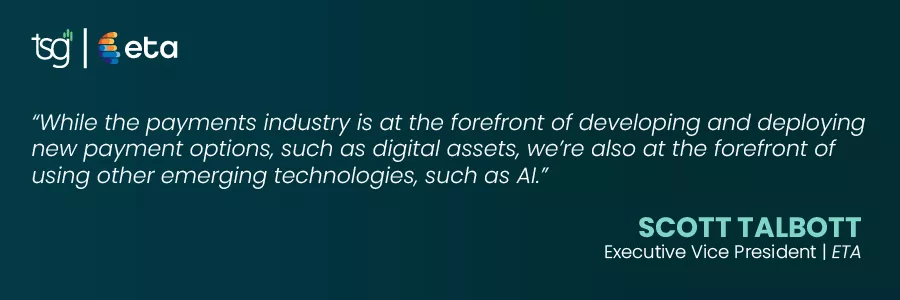
The Executive Interview Series provides readers with exclusive insights from movers and shakers in the payments industry. The payments industry is under continuous transformation. This series offers diverse perspectives on everything from strategy to payments technology and the industry’s future.
In this interview, TSG marketing team member Rachel Hartley spoke with Scott Talbott, EVP of Electronic Transaction Association (ETA), to discuss payments in terms of public policy, AI, and looking ahead to 2024.
Scott Talbott is Executive Vice President at the Electronic Transactions Association (ETA) in Washington, D.C. and is responsible for its governmental strategies, and directing ETA’s all federal, state and Canadian policy and advocacy efforts. He also directs all of ETA’s Industry Affairs efforts. Talbott has nearly 30 years of experience advocating for the financial services and fintech industries.
Scott has received numerous accolades in his tenure, including being named a top lobbyist by The Hill for fourteen years in a row from 2009 to 2022, as well as a “winner” for his work during the economic crisis of 2008 by Washingtonian magazine. In 2010, he appeared in the Oscar-winning film “Inside Job.” Once named NPR’s favorite bank lobbyist and the voice of the financial services industry, he frequently testifies before U.S Congress, in state capitols, and the Canadian Senate, and is a regular contributor to both national and international media. Talbott received his B.A. from Georgetown University, cum laude, and his J.D. from George Mason University School of Law.
Q: Rachel H.
What is the compliance/enforcement environment for payments companies in D.C. where U.S. Policymakers and federal regulators have taken a closer look at payments?
A: Scott T.
The compliance and enforcement environment for payments companies in Washington, DC, is creating headwinds due to increased attention from legislatures and regulators. Policymakers and regulators are paying close attention to the payments industry, including fintech, mobile wallets, P2P, and buy-now-pay-later (BNPL) services. The rapid growth of digital payments, fintech innovations, and new payment models led to this increased scrutiny. Policymakers are focusing on ensuing consumer protection, safety and soundness, transparency, and maintaining market integrity. Regulators are also focused on addressing potential risks related to data security, anti-money laundering (AML), consumer lending practices, and compliance with existing financial laws and regulations.
Additionally, the Consumer Financial Protection Bureau (CFPB) has signaled a desire to expand its supervisory authority over the payments market. Specifically, nonbank fintechs operating in the payments space. It plans to introduce a new rule that will give the bureau the authority to supervise these participants.
Q: Rachel H.
What emerging technologies are currently under regulatory scrutiny in the payments industry?
A: Scott T.
Regulators are closely monitoring the use of new products and technologies by the payments industry to ensure that innovation aligns with the shared goals of consumer protection, financial stability, and compliance with relevant regulations. Regulatory frameworks will likely be updated as these technologies evolve and become more mainstream. Two prominent examples of these emerging technologies are digital assets and AI.
Cryptocurrencies like Bitcoin, Ethereum, and various other digital assets have garnered significant attention from regulators. The regulatory focus ranges from classifying cryptocurrencies as commodities or securities to ensuring compliance with anti-money laundering (AML) and know-your-customer (KYC) regulations. Regulators are also looking into mandating disclosures and capital reserves for private market stablecoins.
While the payments industry is at the forefront of developing and deploying new payment options, such as digital assets, we’re also at the forefront of using other emerging technologies, such as AI. The payments industry has safely used AI to improve the consumers’ experience by making payments more secure and frictionless. For their part, policymakers have raised questions about transparency, potential bias, and accountability. All the while ensuring that AI-driven decisions are fair, explainable, and compliant with existing regulations.
Q: Rachel H.
With the recent Office of the Comptroller of the Currency (OCC) directive regarding banks’ collaboration with third parties, how do you envision its impact on banks and fintech companies?
A: Scott T.
The recent guidance from the federal bank regulators regarding banks’ collaboration with third parties will likely have meaningful effect on both banks and fintechs. The guidance reflects the increased convergence between banks and fintechs. This guidance emphasizes the need for banks to maintain effective risk management and due diligence when partnering with third-party service providers. Which reflects the regulators’ continuous focus on ensuring the safety and soundness of the financial system.
The guidance will result in a more structured approach to partnerships between banks and fintech companies. At first, the new guidance might add complexity to the partnership process. Still, overall, it’s a positive step to enhance the safety and stability of the financial system by ensuring that risk management and compliance measures are robustly integrated into these increasingly popular collaborations.
Q: Rachel H.
Tell me about the Credit Card Competition Act and its importance within the industry.
A: Scott T.
Senator Durbin (D-IL) has reintroduced the Credit Card Competition Act. The bill, if enacted, would require the largest issuing banks to enable two credit networks on their credit cards. The bill asks the Federal Reserve to draft and implement regulations within one year. Issuing banks could have Visa or Mastercard as an available credit rail, but not both. The proposed bill would require a review of credit networks to protect national security. The Senate bill has four co-sponsors—two Republicans and two Democrats. A companion bill has been introduced in the House. The Senate bill faces serious headwinds because it creates a political challenge for Republicans and Democrats. Namely, every senator has both financial institutions and merchants in their state. The bill will force senators to choose between these two constituents.
Q: Rachel H.
In the realm of AI in payments, have we only scratched the surface of its potential, and how are policymakers thinking about AI?
A: Scott T.
Indeed, the potential of AI in payments and other applications is vast. We’ve only scratched the surface of what AI can achieve. In the payments space, AI technologies are showing significant benefits in enhanced fraud detection, refined risk assessment, customized customer service, and increased operational efficiency within the payments industry. There is still much room for further refinements and development.
Policymakers and regulators are keeping a watchful eye on both the opportunities and challenges AI presents in payments.
Policymakers acknowledge that AI can drive payment innovation by protecting customers from fraud, streamlining payments, and enabling new business models. However, they’re also concerned about potential risks associated with AI, including any potential for algorithmic bias and privacy breaches. They are keen to ensure that AI adheres to all existing legal standards.
Overall, policymakers are approaching AI in payments with a balanced perspective, and ETA will continue to engage in ongoing dialogues to refine any proposals that foster responsible AI adoption.

Q: Rachel H.
How are regulators thinking about enforcement actions?
A: Scott T.
The regulators’ ability to use enforcement actions is ever present. Federal regulators like the FTC and CFPB continue to utilize enforcement actions against payments companies, focusing on constructive knowledge by payments companies of harmful acts by their merchant clients.
Recently, regulators have expressed apprehension regarding the inherent risks associated with “shadow banking” and fintech firms offering banking-like services without adhering to equivalent regulatory standards and safeguards.
The CFPB has recently revealed its plans to develop a rule that oversees and examines payment services. Specifically, ones offered by major technology corporations known as “Big Tech.” In a related development, the CFPB issued a consumer advisory in June, raising apprehensions about risk factors associated with nonbank payment applications that hold substantial customer funds. This concern stems from the observation that many applications may need to safeguard customer funds through federally insured bank deposits.
Therefore, as payments become more integrated into our daily lives, expect the regulators to continue to monitor the industry more closely. Enforcement actions are a tool at their disposal.
Q: Rachel H.
As we look ahead to 2024, what are the top regulatory considerations that should prominently feature on the strategic agenda of every fintech firm?
A: Scott T.
As we approach 2024, fintech firms should prepare to address a range of regulatory considerations. This will ensure their continued growth, innovation, and compliance with all laws and regulations. Here are some top regulatory considerations that should prominently feature on the strategic agenda of every fintech firm:
- Digital Identity and KYC/AML Regulations: Fintech firms should continue to focus on robust Know Your Customer (KYC) and Anti-Money Laundering (AML) processes. Regulatory agencies increasingly emphasize the need for digital identity verification methods to prevent fraud and financial crimes. Firms should adopt secure and efficient identity verification technologies while staying compliant with evolving AML regulations.
- Data Privacy and Consumer Protection: With the proliferation of data-driven fintech solutions, firms must navigate data privacy regulations like the General Data Protection Regulation (GDPR) and similar laws in various states like California. Implementing robust data protection practices, obtaining proper user consent, and ensuring proper data usage will be essential to maintaining consumer trust and avoiding regulatory scrutiny.
- Open Banking and APIs: Open banking initiatives continue to expand, promoting competition and innovation. Fintech firms should align their practices with open banking regulations. Thus, ensuring secure API access and data sharing while safeguarding user information. Compliance with Payment Services Directive 2 (PSD2) and similar regulations is crucial. The CFPB is preparing a rulemaking for Open Banking.
Fintech firms in 2024 will have to continue to navigate an increasingly complex regulatory landscape that accompanies their pursuit of innovation. Please join us at ETA’s Payments Compliance Conference in November. There we will delve deeper into these crucial questions and engage with experts shaping the future of payments compliance. Discover insights, best practices, and strategies to thrive in an evolving regulatory landscape while embracing innovation.
Related: Ease of Entry for Software Companies | Game-Changing Opportunities for SaaS Providers | Five Considerations When Developing an Embedded Payments Strategy